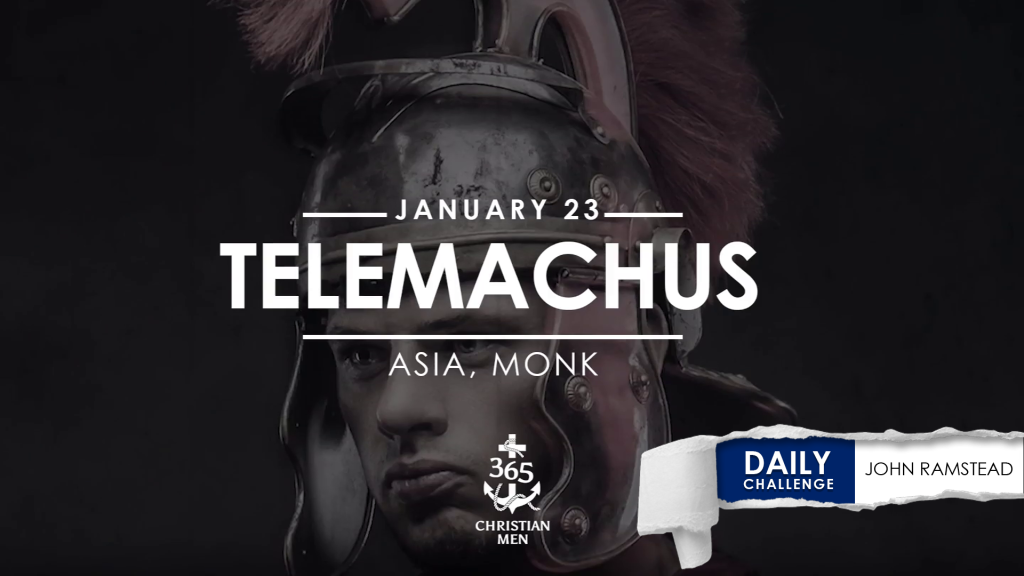January 23. Telemachus. By the year 404, bloody gladiatorial battles had been going on for 140 years.
On this date in 393, Honorius became Emperor of Rome. Five years before today’s story starts, the Emperor had decreed the violent games should stop, but they went right on—until Telemachus showed up.
Sizewise, he was a little man, but he has an important story. In 1984, President Ronald Reagan “told the story of ‘the little monk’” at the Annual National Prayer Breakfast. Here it is for you now.
When a godly man stands, evil falls.
In shiny armor and distinctive helmets crowned with ostrich and peacock feathers, the gladiators strode into the packed arena, some carrying swords and others holding spears or nets. They were professional warriors who fought to the death—supposedly for the glory of Caesar.
Some gladiators were slaves, and some were criminals condemned to the arena. They marched around the arena crowded with 87,000 spectators, who—anticipating the carnage to come—cheered.
These spectators loved to see bloodshed.
In front of the Emperor’s box, the combatants stopped, raised their arms in salute, and in one voice they shouted, “Hail, Caesar, those who are about to die salute thee!”
The crowd cheered again.
On the first day of January in 404, a monk named Telemachus happened to be walking past the coliseum. He was from Asia and on a pilgrimage to visit the churches and encourage the Christians in Rome. Dressed in his simple monk’s mantle, which reflected his holy life of prayer and self-denial, Telemachus stood in sharp contrast to all the spectators flocking into the coliseum. What he saw overwhelmed him.
Drawn by the noise, Telemachus got sucked into a crowd, and the crowd pressed him forward into the coliseum. There before him were the gladiators, engaged in combat.
The crowd loved long and skillful battles, but when one fighter was obviously overmatched, the spectators voted on whether the loser would live or die.
With each thumbs-down, the superior fighter thrust his weapon into the loser, and another person entered the arena and clubbed him on the head with a mallet. His corpse was dragged away, and Rome’s death-roar intensified. They called it entertainment and paid heavy purses to the winners.
The brutality of the crowd stunned Telemachus. The greedy acceptance of violence and death opposed the vow he had taken as a monk. His life was about structure that allowed him to live a life of prayer and work. The sight and sound of tens of thousands of screaming people rejoicing in this slaughter grieved his spirit.
He raced down to the arena floor and pushed his way through the rabid crowd until he reached the wall, jumped over it, and strode out onto the field of battle. He went unnoticed by the crowd until he got close to two gladiators engaged in a life-and-death struggle. Telemachus stepped between the two battling gladiators and cried out, “In the name of Christ, stop. In the name of Christ, stop.”
Enraged, the gladiators turned their anger on Telemachus. They stabbed him to death. The crowd joined in and rained rocks down upon him, and his lifeless body lay at the gladiators’ feet.
When the news of what Telemachus had done reached Emperor Honorius, who had been taught by the Church, he was so affected that he immediately counted Telemachus among the victorious martyrs. Within three days, he proclaimed an end to the gladiator games that had been going on in Rome since 264 BC There was never another battle between gladiators.
“Do not be overcome by evil, but overcome evil with good” (Romans 12:21 ESV).
What ongoing evil has God shown you that calls for you to speak out in love and overcome it with good? When a godly man stands, evil falls.
Cartwright, Mark. “Roman Gladiator.” Published May 3, 2018. ANCIENT HISTORY ENCYCLOPEDIA. https://www.ancient.eu/gladiator/.
Foxe, John. “The Last Roman Triumph.” Foxe’s Book of Martyrs. New Kensington, PA: Whitaker House, 1981.
Theodoret, Bishop of Cyrrhus, “Honorius the Emperor, and the Monk Telemachus” Ecclesiastical History: A history of the church in 5 books from A.D.322 to the death of Theodore of Mopsuestia, A.D.427. Book 5. London: Samuel Bagster and Sons, 1843.
Matthews, Rupert. “The end of the gladiators.” From The Age of the Gladiators by Rupert Matthews. Accessed September 10, 2020. The History Notes. http://www.historynotes.info/the-end-of-the-gladiators-3180/? __cf_chl_jschl_tk__=6f957a7c75faa6c7a815f848f0432137cc1553a2–1582664923–0-AQbYgcqFAIMmFJFf14hPExlDRxB_lyiu0C4D6GZmMIx1lfK7K3rkmY61q_6ktapxvaViZAdMUqzQMt1P_ht1a04m4xiJQMEve_MuyWNTH4vx-e41M_nEinsQMkoE0Pdptej3JBW3eItbf9ei8UCIsUgnyoqWTWqqgHgRXKaBlxXHPgZDaYzsFEqfwZFlJXmIuai1NeBMUCpHxnefGAFOIRT10Xij0F-WExNXD43WVUg-I7dvfEht9WBdmUPcug6I5–6YVaKjzoxN6G6WPK9XDeku3ZfnQyjsOknEoIJ6XvQMc9UUFrhxKXr-fzewXJZWUA.
Preston, Monk. “Favorite Monks: Telemachus: The Monk Who Ended the Coliseum Games.” Prayer Foundation. Published 2002. https://www.prayerfoundation.org/favoritemonks/favorite_monks_telemachus_coliseum.htm.
Would You Like to Learn More About This Man?
First century philosopher and lawyer Seneca wrote about the gladiatorial games: “Man is a thing which is sacred to humanity, but nowadays he is killed in play or for fun. It was once a sin to teach how to inflict wounds, but now a man is led out naked and defenseless and provides a good show by his death.”
At another time, Seneca wrote: “It is pure murder. The men have no armour. They are exposed to blows at all points, and no one ever strikes in vain. Many prefer this event to the usual pairs (of gladiators) and to the bouts by request. Of course they do, there is no helmet or shield to deflect the weapon. What is the need of defensive armour or of skill? All these mean delaying death. In the morning they throw men to the lions and the bears: at noon they throw them to the spectators. The crowd demands that the slayer shall face the man who is to slay him in his turn; and they always reserve the latest killer for another killing.”
Story written by: Thomas Mitchell, http://www.walkwithgod.org/





